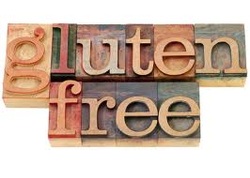 About ten years ago I was diagnosed with Coeliac Disease. At the time I wasn’t sure what that was, but I recall my gastroenterologist saying “No more breads and cereals for you”. A decade ago I hadn’t heard of Coeliac Disease and the term ‘gluten free’ wasn’t something I had ever come across. I remember thinking I would starve to death. Each morning I’d consume two Weet-Bix for breakfast and always had a salad sandwich from the school canteen for lunch. After going to the gym in the evenings I’d eat a bowl of untoasted muesli as I prepared a vegetarian dinner that usually featured pasta or couscous. Back in the day (before becoming a dietitian) I thought my diet was pretty ‘bang on’; but it was making me sick, it was full of gluten and I was always hungry. My Coeliac Disease meant that I wasn’t absorbing certain nutrients and my intestines were in a bad way. All that seems like a lifetime ago, but I remember feeling overwhelmed and unsure about what I should eat. There wasn’t a shopping aisle devoted to gluten free goodies back then. I started out devouring bucket loads of rice to fuel my training as a group fitness instructor. My rice cooker was used almost every night. Let me tell you, there are loads of nutrient dense gluten free carbohydrate sources other than rice! Ten years after my diagnosis there are now hundreds of gluten free products available and strangely eating ‘gluten free’ has become some sort of trend. People seem to think that eating gluten free will make them lose weight or that it’s healthier, but to be honest, some gluten free products are ghastly and are often high GI and laden with fat or sugar. Fact is, eating gluten free won’t help you lose weight and isn’t always the best option; that is unless you have gluten intolerance or Coeliac Disease. Dr. David Katz, director of the Yale University Prevention Research Center, said people who cut gluten to stay slim are relying on a strategy common to almost all quick-fix diets: restricting food choices. “When people have fewer choices, they tend to eat less and lose weight accordingly,” he said. “But you could accomplish the same thing by consuming only healthful, wholesome foods, including whole grains that do contain gluten. The result would be an easier, more sustainable, and potentially more nutritious diet overall.” There is nothing unhealthy about gluten unless someone has a true sensitivity or Coeliac Disease like myself. Gluten is simply a protein that has been in the human diet since the dawn of agriculture and acts like a ‘glue’ in baked goods; giving stretch and rise to foods like breads. If you suspect you have a gluten intolerance or Coeliac Disease you need to be tested. If the results come back positive, I promise you, you won’t starve to death and you will feel so much better. It’s important you seek advice from an Accredited Practising Dietitian like Dr Joanna or myself to help you establish a well balanced gluten free diet. If your results come back negative, don’t cut out wholegrain breads and cereals because you think you’ll be healthier. Wholegrains are a superb source of fibre and minerals that will keep your gut and bowel healthy for life. For more information about symptoms and testing, I highly recommend checking out this website:http://www.coeliac.org.au/ . Here you will learn about symptoms, diagnosis and following a gluten free diet if you are diagnosed with an intolerance or Coeliac Disease like me. Live, love, life… Lisa x
0 Comments
Your comment will be posted after it is approved.
Leave a Reply. |
News FEEDFitness, Energy, Education & Diet Archives
June 2020
Categories
All
|
 RSS Feed
RSS Feed